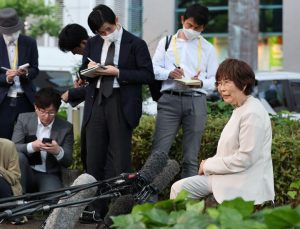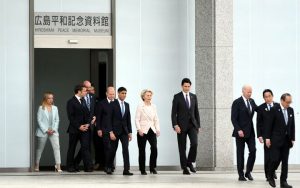Documenting Hiroshima 80 years after the A-bombing: May 19, 2023, Hiroshima Summit
Jun. 3, 2025
An A-bomb survivor testified to world leaders about the horrors of the A-bombing
by Michio Shimotaka, Staff Writer
On May 19, 2023, Keiko Ogura, 87, an atomic bomb survivor living in Hiroshima’s Naka Ward, met on the third floor of the east wing of the Peace Memorial Museum, with world leaders who visited Peace Memorial Park in Naka Ward for the summit meeting of the G7 (Group of Seven industrialized nations). Among them were U.S. President Joe Biden, representing the nuclear superpower country that dropped the atomic bombs, U.K. Prime Minister Rishi Sunak, and French President Emmanuel Macron, whose nations both possess nuclear weapons.
One folded paper crane
In the east wing, special exhibits featured a tricycle and school uniforms left behind by A-bomb victims, along with folded paper cranes made by Sadako Sasaki, who died of leukemia at the age of 12, ten years after the A-bombing. Ms. Ogura said the leaders spoke and nodded to one another.
In her testimony in English, she emphasized the lasting effects of radiation, which have continued gnawing at the mind and body of A-bomb survivors, along with her own experience of the A-bombing and that of Sadako, conveying her feelings toward the abolition of nuclear weapons. She shook hands with each of the leaders, who had listened intently to her story. A U.S. government official slipped one folded paper crane into her jacket pocket, and she wondered, “Was it some kind of gesture for the A-bomb victims?”
The leaders left heartfelt messages in the museum’s guestbook. President Biden wrote, “Together let us continue to make progress toward the day when we can finally and forever rid the world of nuclear weapons.” Prime Minister Sunak wrote, “What we can say, with all our hearts and all our souls, is no more.” After touring the museum, the leaders discussed the situation in Ukraine, nuclear disarmament, and nuclear non-proliferation at a hotel in Minami Ward and later at an inn on Miyajima Island in Hatsukaichi.
They affirmed the principle of nuclear deterrence
That night, the leaders issued the Hiroshima Vision, a document regarding nuclear disarmament. The document stated that Hiroshima, together with Nagasaki “offers a reminder of the unprecedented devastation and immense human suffering.” It also criticized the Russian invasion of Ukraine, referring to Russia’s threats to use nuclear weapons. However, the vision stressed, “Nuclear weapons, for as long as they exist, should serve defensive purposes, deter aggression and prevent war and coercion.” In effect, the statement affirmed the principle of nuclear deterrence.
Toshiyuki Mimaki, co-chair of the Japan Confederation of A- and H-Bomb Sufferers Organizations (Nihon Hidankyo), said, “I cannot agree with the view that the world is safe thanks to nuclear weapons.” Setsuko Thurlow commented that the vision “only affirms nuclear arms for one’s own country, but condemns the weapons of other nations in conflict.” A-bomb survivors, who regard nuclear weapons as absolute evil, voiced their criticism one after another.
The summit marked an unprecedented development, and on its final day, May 21, Ukrainian President Volodymyr Zelenskyy made an unexpected appearance. Ms. Ogura once again spoke about her experience of the A-bombing at the east wing of the Peace Memorial Museum. This morning, South Korean President Yoon Suk-yeol, who took part in the extended summit meeting, laid flowers at the monument in Memory of the Korean Victims of the A-bomb.
For three days, attention was focused from many angles on the damage in Hiroshima, yet progress in nuclear disarmament remains limited after the summit’s close and war in Ukraine continues. Feeling the weight of international politics, Ms. Ogura looks ahead. She said, “When I spoke about the A-bombing in the U.S. about 35 years ago, all of them told me it had been the right thing to do, and I was appalled. But things have been changing little by little. I sometimes feel empty inside, but I must keep speaking out.”
In October 2023, five months after the summit’s close, Israel, a de facto nuclear weapon state, began fighting with the Islamic organization Hamas. Some government officials in Israel described a nuclear strike on the Palestinian-controlled Gaza Strip as one possible option, and some members of the U.S. Congress made similar remarks.
A-bomb survivors have tirelessly conveyed what nuclear weapons bring to humanity even though their appeals that war must never be repeated have been trampled many times, and in an international situation in which it would not be surprising to feel emptiness. As the 80th anniversary of the A-bombing approached, even distant Northern Europe regarded them with respect.
(Originally published on June 3, 2025)









